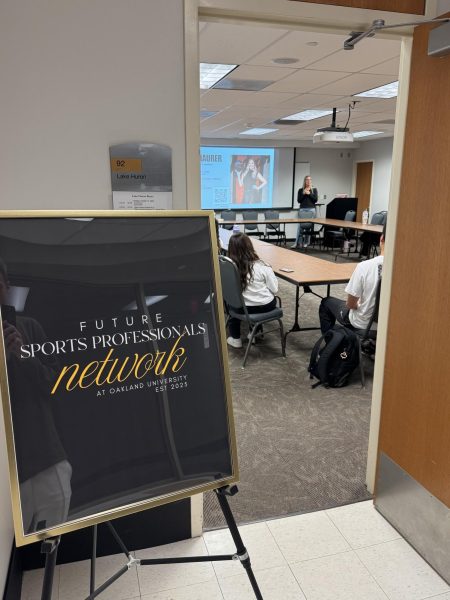Set to sleep mode
While there is no time of the year that is truly safe for the average college student, nothing is more stressful than a winter semester in Michigan. Snow storms, icy roads, painfully cold air – and that’s on top of the normal academic, social and financial burdens students have to face.
Sometimes it can seem like too much to handle.
The Graham Health Center and OU Counseling Center have worked together to bring students a way out of their constant stress, however.
It’s called iPause.
The iPause program was created last semester to teach students about stress and stress management techniques, according to Julie Proctor, health and wellness coordinator at the Graham Health Center.
The first workshop was held in September 2013. Since then, Proctor said over 400 students have attended.
A positive experience
Anyone can request a workshop online or at the Graham Health Center, according to Proctor. So far iPause workshops have been held for dorm floors, employees and various student groups.
The most recent workshop was held in the 3 North Hamlin Lounge Tuesday from 7 to 8 p.m. It was set up by the floor’s Academic Peer Mentor, sophomore Derrik Germaine.
“I actually attended one through the tutor center when I was being trained,” said Germaine. “I really thought I benefited from it and I feel like my residents can benefit.”
Each workshop includes a discussion about stress, a guided meditation and a three to five minute neck and shoulder massage per person.
One of the stress management techniques taught during the workshop was five-to-nine breathing – inhaling for five seconds and exhaling for nine seconds.
Breathing out longer than breathing in triggers relaxation responses in the body, according to Proctor.
“Sometimes we can make ourselves reach further not by pushing harder but by just letting go,” said one of the Peer Ambassadors while leading the session.
Another technique taught was the body scan, an exercise that aims to strengthen personal awareness of the mind and the body. The exercise involves focusing on individual body parts one at a time.
Morgan Nelson, 5th year wellness and health promotion major, was one of the volunteers to give massages Tuesday night.
So far Nelson said she has felt really good about the difference iPause is making in students’ lives.
“I think it’s really helping students so far,” said Nelson. “We’re still collecting data… but the hope is to reduce perceived stress in OU students.”
Travis Skarei and Bradley Rowe, both freshman who attended the workshop Tuesday night, said they were glad they attended.
“I feel a lot more relaxed now than I was 30 minutes ago,” said Rowe. “It’s very helpful.”
Both students said that although it wouldn’t feel the same, they would try to use some of the breathing techniques they learned to de-stress.
“It was actually very peaceful,” said Skarei. “It’s a good program to go to. Do it.”
After the session the students could write what they are thankful for in a gratitude journal, which over 200 other students have written in, according to Nelson.
Continuing to expand
“I am so excited about this because this is something that I have been wanting to bring to students at OU for a really, really long time,” said Proctor.
So far Proctor said she and other iPause members are excited to see how the program is developing and affecting Oakland University students.
“It’s going really well,” said Proctor. “The response has been really positive and the students have said that they’ve really learned something that they can then apply to their life.”
Proctor said they have not just heard it from students – they’ve seen it in the research as well.
There is a wellness program evaluation class at OU that is gathering information on iPause and analysing it, according to Proctor.
“The data that they have gotten so far from the past semester has shown that the students are now willing to try some different stress relief techniques and that we’ve broken down some of the barriers to those techniques,” said Proctor. “That’s really huge.”
Surveys taken before and after each workshop have shown positive change in stress perception as well.
“We’re reaching a lot of students,” said Proctor. “And it’s not just some workshop that they can never replicate themselves – all the things that we’re teaching them they can do on their own.”
In addition to the workshops, Proctor said the program now has a website full of resources and information. The website is still in development and is always ready for new ideas from students.
“I think as we develop this website it’s going to be a really powerful tool for students that they can reach 24/7,” said Proctor.




